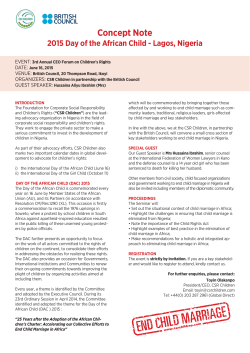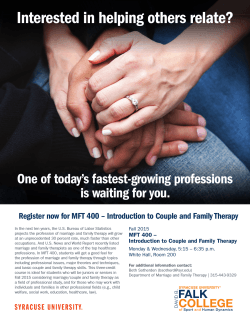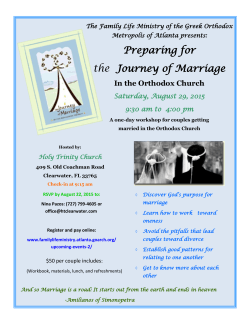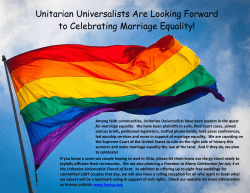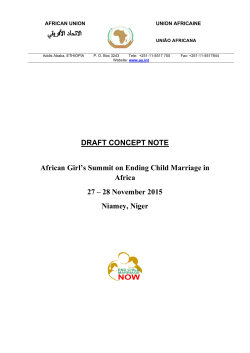
Draft Concept Note - African Union Pages
AFRICAN UNION UNION AFRICAINE UNIÃO AFRICANA Addis Ababa, ETHIOPIA, P.O. Box 3243 Telephone : 011-551 7700 Fax : 011-551 7844 website : www. africa-union.org DEPARTMENT OF SOCIAL AFFAIRS, AFRICAN UNION COMMISSION COURSE ON ENDING CHILD MARRIAGE AND HARMFUL TRADITIONAL PRACTICES IN AFRICAMECHANISMS AND STRATEGIES September 2015 Draft Concept Note 1 CONCEPT NOTE 1. INTRODUCTION Africa has the second highest rates of child marriage in world after South Asia.1 West and Central Africa in particular follow closely on the heels of South Asia with two out of five (41%) girls marrying before 18 years.2 Child marriage is a complex issue that is driven by a number of factors in different societies. Gender inequality due to entrenched societal differentiation between males and females based on economic status, class, ethnicity, caste, sexuality, religion, traditional norms, HIV status, and disability among others, is a major factor. In patriarchal cultures, where girls lack the same perceived value as boys right from birth; families and communities may discount the benefits of educating and investing in their daughters’ development. Child brides are a strong reflection of pervasive gender discrimination. Child marriage is a human rights violation and has been included in a number of legal instruments at the continental and international levels. The African Charter on the Rights and Welfare of the Child (ACRWC) defines a child as a person under the age of 18 years, and the African Youth Charter defines a minor as a person between the ages of 15-17. Furthermore, girls aged 15 to 19 are faced with maternal mortality and morbidity as a result of pregnancy and childbirth.3 Child brides are prone to disabilities associated with early childbirth: obstetric fistula, Sexually Transmitted Diseases (STDs) including HIV and incontinence.4 Studies have also shown that early sexual debut among girls – particularly those with little or no access to education – increases their vulnerability to child marriage. Child marriage also affects girls’ education, child brides usually drop out of school and are denied the opportunity to complete their education, significantly reducing their ability to earn an income and lift themselves and their children out of poverty. Conversely, if girls are able to stay in school and avoid early marriage, the benefits are widely felt. 1 UNICEF, ‘UNICEF Data: Monitoring the Situation of Women and Children – Child Marriage’. Available at http://data.unicef.org/child-protection/child-marriage (last accessed on 1st October 2014). 2 UNFPA (2012) p 26. 3 rd ACERWC, ‘Addis Ababa Declaration to End Child Marriage in Africa’ 23 Session of the African Committee of Experts on the Rights and Welfare of the Child, para 4 of the Preamble. 4 ACERWC, ‘Addis Ababa Declaration to End Child Marriage in Africa’ para 4 of the Preamble. 2 The incidence of teenage pregnancy has also been associated with child marriage. Although a multi-factor problem, poverty, illiteracy, family financing pressures and societal norms predominantly account for inducing girls to enter into sexual activity resulting in teenage pregnancy.5 Despite the fact that child marriage is still socially accepted it cannot be denied that a girl is deliberately exposed to sexual abuse and exploitation, usually by her parents, family and influences within the community. The African Union considers this as a major hindrance to the development of the continent and this practice has to be faced if the continent is to be seen as progressive and ready to tackle the ever evolving dynamics of a changing world. The Commission launched a Campaign to End Child Marriage in May 2014 and has been focusing on a number of activities Following the continental launch, two specific appointments were made in order to enhance the advocacy and visibility of the Campaign - an AU Goodwill Ambassador Ms Nyaradzai Gumbonzvanda- Executive Director of YWCA Geneva and a Special Rapporteur - Dr Fatima Delladj-Sebaa- Member of the African Committee on The Rights and Welfare of the Child, were appointed. To also kick-start the 2015 AU Year of Women’s Empowerment and Development towards Africa’s Agenda 2063, African Union Heads of State and Government and African First Ladies were hosted to a High Level Breakfast meeting on accelerating efforts to end child marriage in Africa. The event, which was hosted by His Excellency, the President of Chad, Mr. Idriss Deby Itno and the First Lady of Chad, Mme Hinda Deby Itno, focused on mobilizing continental awareness for the campaign, build on recent achievement and make greater strides to prevent the harmful effects of child marriage in Africa. A major outcome of this meeting was the commitment to the Communique to End Child Marriage in Africa by all leaders present. Over the four year period of the campaign, the AUC has selected 30 countries* in which it intends to launch the campaign. Three countries (Burkina Faso, Chad, Ethiopia and Niger) have so far launched the campaign. In 2015, the country launches are also planned for DRC, Guinea Bissau, Madagascar, Mali, Nigeria, Uganda and Zimbabwe. The role of partners in the Campaign is crucial, as most partners that support the AUC in the Campaign have already been working in the area of ending child marriage on the 5 Keller ET al, ‘Teenage Pregnancy and Motherhood in a Ghanaian Community’ Journal of Social Development in Africa (1999) Vol 14 No.1 69 – 84 at p 69. Available at http://archive.lib.msu.edu/DMC/African%20Journals/pdfs/social%20development/vol14no1/jsda01400100 8.pdf (Last accessed on 20 January 2015). 3 continent and also globally and they bring forth their valuable experience to the Campaign. 2. OBJECTIVE OF THE COURSE The overarching objective of the course is to provide an understanding of child marriage and other harmful traditional practices within the broad framework of social development linking it to the key goals and outcomes of the AUC Campaign to End Child Marriage in Africa, AU’s Agenda 2063 and post MDG agenda, in order to be suitably or better equipped to design and manage development plans in which social and economic policies and strategies are fully interfaced to deliver the kinds of transformative outcomes desired in Africa today. More specifically, the course will provide training on all dimensions of harmful traditional practices programme (HTP), specifically the design, implementation, monitoring, and evaluation, doing so on the basis primarily of the expressed interest of African governments and also fully involve regional economic communities and selected civil society networks to be part of this training. It is expected that the trainings will take place with experts from these countries. The first training will be in the second quarter of 2015 in southern region. 3. POLICY AGENDA SERVED BY THE COURSE The course will respond to the needs articulated by African governments for a corpus of skilled mid-level and senior personnel; programme officer and or manager in regional economic communities and CSOs who are adequately equipped to design, implement, monitor, and evaluate social policies that dovetail with national regional development needs and aspirations. 4. TARGET PARTICIPANTS Participants will be invited from AU Member States (2 participants per Member State), RECS ( 1 from each), CSO networks (2) and the AU Commission to attend the training course. Target participants are: - Middle and senior level policy officials and managers directly connected with or responsible for planning, designing, managing, monitoring and evaluating development plans and policies in their countries particularly in the area of HTP; - Officials of Regional Economic Communities (RECs) and CSOs with 4 programmatic interest in the domain of social development planning particularly in the area of HTP; The African Union Commission strongly encourages and supports the participation of suitably qualified female officials in its capacity development and training programme. SKILLS TO BE IMPARTED 5. By the end of the capacity-enhancement training programme, the participants are expected to have acquired: - Insights into comparative experiences of social development design and implementation specifically HTP from other regions of the world; - A strong appreciation of the interconnections between social and economic development objectives and social development outcomes; - A full appreciation of the value of integrated and holistic public policymaking with a strong social content; - An understanding and appreciation of the multi-dimensionality of social policy instruments and social policy functions, including the ways in which particular social policy instruments( regional and continental) produce multiple outcomes; - A robust capacity implementation; - Technics for monitoring and evaluating social development programmes and initiatives; and - A capacity to effectively engage with extra-territorial actors who offer policy advice, including policy consultants. design social development programmes for MODE OF DELIVERY 6. - 7. to The course will be delivered in English Resource persons with a first-hand knowledge of Africa’s social policy landscape, the strategies for interfacing economic and social policy, and practices of HTP will drive the course. PEDAGOGICAL APPROACH 5 - The pedagogical approach will combine lectures, practical applications through the use of case studies and group discussions. Group work will also be employed to promote peer learning and impart knowledge and skills. Participants admitted into the training programme should be prepared to present short technical reports on their own experience on the course theme. 8. DATES AND DURATION - Number of days: 5 - Dates: September 2015 9. TRAINING PROGRAMME AND MATERIALS The outline of the training programme and other relevant information will be posted on the AU website, End Child marriage campaign homepage and other relevant documentation and training materials will be circulated during the training course. 10. ORGANIZATIONAL MATTERS The AU Commission will be responsible for the invitations to Member States and secretarial support, will be availed by the institute selected to do the training. 11. PARTICIPATION EXPENSES The cost for the training will be borne by AUC and supporting partners. Once the names of participants have been submitted to AUC with an official letter of assignment (Email address: ThunduN@africa-union.org) by their Member States and RECs, electronic air tickets will be provided to the participants. 9. DEADLINE FOR SUBMISSION OF NOMINATIONS FROM MEMBER STATES:. CONTACT PERSONS: i. Dr. Olawale Maiyegun Director, Department of Social Affairs Addis Ababa, Ethiopia Fax: 00-251-115 533616/517844 Tel: 00-251-115-517700 Ext. 300/251-115-157175 E-Mail: MaiyegunO@africa-union.org ii. Dr Johan Strijdom, Head of Division: Social Welfare, Vulnerable Groups, Drug Control and Crime Prevention, Department of Social Affairs Addis Ababa, Ethiopia 6 Fax: 00-251-115 533616/517844 Tel: 00-251-115-517700 Ext. 279, E-Mail: STRIJDOMJ@africa-union.org; 7
© Copyright 2025

